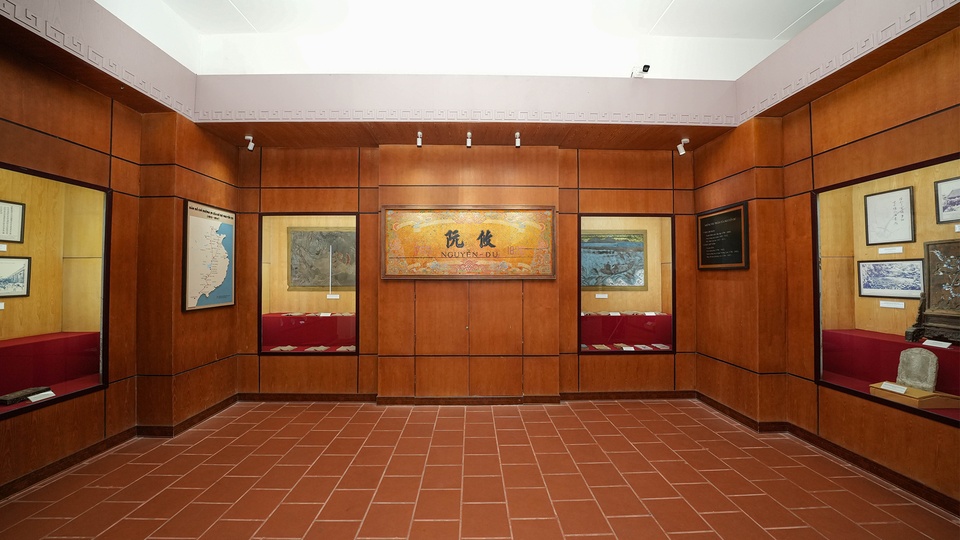
12. The life and career of Nguyen Du
3430Ladies and gentlemen!
The great poet Nguyen Du (born in 1765, died in 1820), whose given name was To Nhu and whose pen name was Thanh Hien, was born in Thang Long. His father was Nguyen Nghiem, a Grand Chancellor to the court, and his mother was Tran Thi Tan from Hoa Thieu village, Dong Ngan district, Bac Ninh province (now Kim Thieu village, Huong Mac commune, Tu Son city). In the year of Tan Mao (1771), Nguyen Du followed his father back to his hometown. At the age of 13, he became an orphan.
During the years of war and chaos, Nguyen Du took refuge at the residence of his brother-in-law, Doan Nguyen Tuan, in Thai Binh province. In the year of Tan Hoi (1791), Nguyen Quynh, his fourth half-brother who fought against the Tay Son regime, was killed, and the residence of the Nguyen clan in Tien Dien was abolished. After the “ten years of wind and dust" - his years of poverty and hardship in his wife's hometown, Nguyen Du and his son Nguyen Tu returned to their hometown in Tien Dien. With his father's estate in ruins and his brothers separated, Nguyen Du was given a piece of land in Thuan My village by his relatives to build a house and lived there by hunting and fishing. From then on, Nguyen Du had the nicknames "Hong Son hiep lo" (the hunter of Hong Mountain) and "Nam Hai dieu do" (the fisherman of the Southern Sea).
In the winter of the year of Binh Thin (1796), Nguyen Du intended to escape to Gia Dinh to follow Nguyen Anh (the future Emperor Gia Long), but was arrested and released by Tay Son general Nguyen Than. In the year of Nham Tuat (1802), Gia Long ascended the throne, and in August of the same year, Nguyen Du was appointed as the chief of Phu Dung district in Khoai Chau prefecture, Son Nam ward. In November he was appointed as the chief of Thuong Tin prefecture, Son Nam ward. In the fall of the year of Giap Ty (1804), he got ill and returned to his hometown. In the spring of the year of At Suu (1805), Emperor Gia Long summoned him to the capital, and was promoted to Dong Cac Dien Hoc Si (a supreme mandarin title), with the title of Du Duc Hau (5th rank); In 1809, Nguyen Du held the mandarin position of Cai Ba Quang Binh; In February of the year of Quy Dau (1813), he was summoned to the capital, promoted to the rank of Chanh dien hoc si, and sent to China as an envoy. In April of the year of Giap Tuat (1814), Nguyen Du returned to the country, wrote a collection of poems "Bac Hanh Tap Luc" (meaning “Thoughts on the envoy voyage to the North”), and was promoted by Emperor Gia Long to the position of Huu Tham tri (3rd rank) of Ministry of Rites, again holding the title of Du Duc Hau. In August of the year of Canh Thin (1820), Emperor Minh Mang ascended the throne after the death of Emperor Gia Long, and Nguyen Du was sent as the Chief Envoy to the Qing court to report the passing. However, he fell ill before the voyage and died in the capital city of Hue on August 10 (which is September 16th, 1820 according to the modern calendar), at the age of 55.
Nguyen Du’s legacy to humanity is many classic literary works in Chinese characters such as Thanh Hien Thi Tap, Nam Trung Tap Ngam, and Bac Hanh Tap Luc, as well as works in Nom characters such as Van Te Thap Loai Chung Sinh, Van Te Truong Luu Nhi Nu, Thac Loi Trai Phuong Non, etc. His immortal masterpiece is The Tale of Kieu - a literary work of great humanity that made him a World Cultural Figure by UNESCO.
Next, we invite you to visit the artifacts associated with the life and career of Nguyen Du, thereby understanding more about the life of the Great National Poet.




